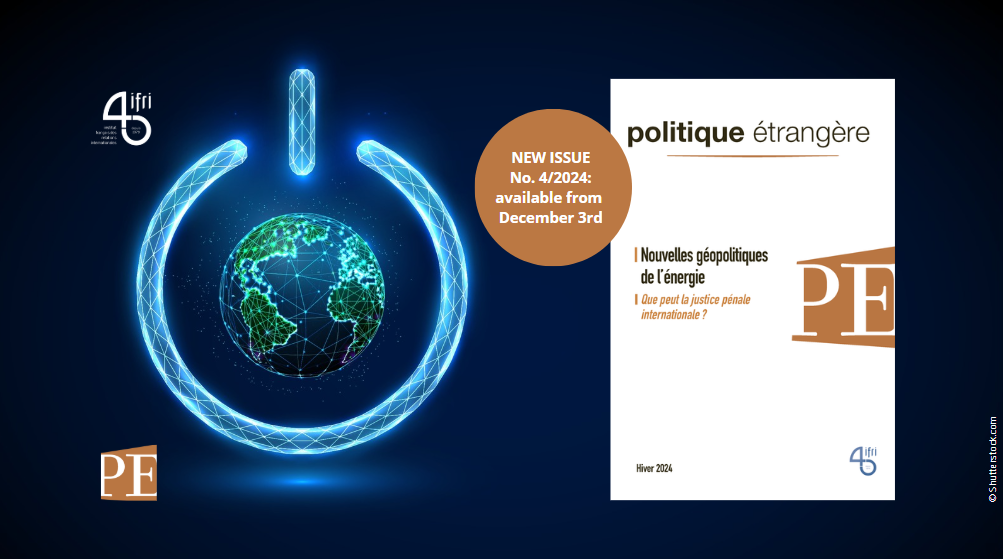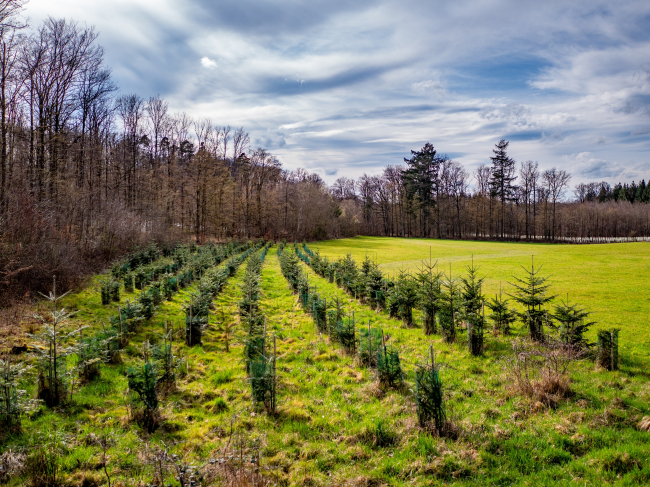The New Geopolitics of Energy

Following the dramatic floods in Valencia, and as COP29 opens in Baku, climate change is forcing us to closely reexamine the pace—and the stumbling blocks—of the energy transition.

Do the oil states in the Gulf have the desire and the means to transition away from oil and gas? Have the member states of the European Union made any progress since their piecemeal response to the Russian gas diktat? Will European and American strategies ever align? What place will nuclear and renewable energies occupy in the world of tomorrow, and beyond?In another arena, a faltering multilateralism—even on major matters transcending national boundaries—is holding back the work of the International Criminal Court.
And yet the ICC has come far since it was founded by the Rome Statute, exercising its jurisdiction over the most serious of crimes taking place in Ukraine and in Gaza. This undoubtedly marks a watershed in the short history of international criminal justice. Only time will tell whether national governments will rally behind the ICC’s progress, or whether it will have to settle for a more symbolic role as custodian of morality and international law.
International negotiations on climate change, and international prosecutions for the most egregious crimes: these are two areas where multilateralism, in dire need of reform, is struggling to assert itself within existing legal frameworks.
This issue is available in French only: Nouvelles géopolitiques de l'énergie
THE NEW GEOPOLITICS OF ENERGY
The Oil States in the Gulf: The End of Fossil Fuels?, by Kate Dourian
How have European Countries Disconnected themselves from Russian Gas?, by Didier Holleaux
The United States, the European Union, and the Green Great Game, by Alexandre Damiens
The Geopolitics of Renewable Energy, by Cédric Tellenne
Nuclear Energy: A Positive Outlook?, by Teva Meyer
WHAT DOES THE FUTURE HOLD FOR INTERNATIONAL CRIMINAL JUSTICE?
International Criminal Justice: A Decisive Moment, by Marc Perrin de Brichambaut
The International Criminal Court, between History and Geopolitics, by Joël Hubrecht and Virginie Sansico
CURRENT AFFAIRS
The Axis of Resistance: Iran’s Proxies since October 7, 2023, by Kévin Thiévon
Reforming the United Kingdom?, by Marie-Claire Considère-Charon
BAROMETERS
Asia and the Demographic Shock, by Paul Salez
From Cuba to Ukraine: Strategic Signaling and Nuclear Deterrence, by Héloise Fayet
REFLECTIONS
Would France Benefit from Leaving the European Union?, by Maxime Lefebvre
Switzerland’s Impossible Neutrality, by Matthieu Etourneau
BOOK REVIEWS
Under the direction of Marc Hecker
Espionner, mentir, détruire. Comment le cyberespace est devenu un champ de bataille, by Martin Untersinger
Soldat de la cyberguerre, by Arnaud Coustillière and Aude Leroy
Subversion: From Covert Operations to Cyber Conflict, by Lennart Maschmeyer
From Julien Nocetti
240 pages. 23 euros.
December 3th, 2024.
Diffusion : Pollen/Dif'Pop.
Subscription: Armand Colin.
To buy an issue: CAIRN.
To buy the Epub (in French): Immatériel.fr.
Have a look on Politique étrangère's blog: Politique étrangère.

Available in:
Regions and themes
ISBN / ISSN
Share
Related centers and programs
Discover our other research centers and programsFind out more
Discover all our analysesAI, Data Centers and Energy Demand: Reassessing and Exploring the Trends
The information and communication technologies sector today accounts for 9% of global electricity consumption, data centers for 1-1.3%, and artificial intelligence (AI) for less than 0.2%. The growing energy demands of cloud services first, and now AI workloads (10% of today’s data centers electricity demand), have exacerbated this trend. In the future, hyperscale data centers will gain shares amongst all kinds of data centers and AI will probably account for around 20% of data centers electricity demand by 2030.
Unlocking India’s Energy Transition: Addressing Grid Flexibility Challenges and Solutions
India is rapidly scaling up its renewable energy (RE) capacity, adding 15–20 GW annually, but the ambitious goal of 500 GW of non-fossil capacity by 2030 is at risk unless the pace accelerates.
Europe’s Black Mass Evasion: From Black Box to Strategic Recycling
EV batteries recycling is a building block for boosting the European Union (EU)’s strategic autonomy in the field of critical raw minerals (CRM) value chains. Yet, recent evolutions in the European EV value chain, marked by cancellations or postponements of projects, are raising the alarm on the prospects of the battery recycling industry in Europe.
Can carbon markets make a breakthrough at COP29?
Voluntary carbon markets (VCMs) have a strong potential, notably to help bridge the climate finance gap, especially for Africa.









